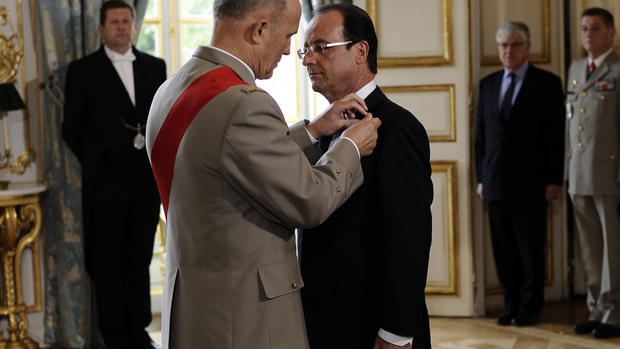Lightning strike delays Hollande trip to Germany
Updated 2:13 PM ET PM
(CBS/AP) PARIS - Newly inaugurated French President Francois Hollande's trip to Germany was delayed Tuesday after a lightning strike forced his plane to turn around. No one was hurt in the incident.
After a succession of rain-drenched and pomp-filled ceremonial inauguration events, Hollande took off in a Falcon 7X aircraft for Berlin. The plane was hit by lightning shortly afterward, and returned to the Villacoublay air base outside Paris as a precaution for inspection, Defense Ministry spokesman Gerard Gachet said.
Pictures: Francois Hollande's inaugurationHollande boarded a new flight bound for Berlin soon after his original plane returned to Paris, CBS Radio News correspondent Elaine Cobbe reported. That made Hollande about an hour and a half late for his first meeting with German Chancellor Angela Merkel.
Hollande is being received by Merkel with an honor guard after which they will hold talks that are expected to be dominated by Europe's debt crisis.
The two leaders are scheduled to hold a joint news conference following the meeting and then have dinner together.
Hollande's decision to fly to Germany within hours of taking office isn't just a sign of how deep Europe's troubles are — it underlines the deep alliance that the former antagonists have developed over the decades since World War II.
Hollande follows predecessor Nicolas Sarkozy in traveling to Berlin on the day of his inauguration to meet Merkel.
And it isn't one-way traffic: Merkel, now on her third French president, headed for Paris — and a meeting with Jacques Chirac — on her first foreign trip the morning after being sworn in as Germany's leader in 2005.
Over the decades, France and Germany have come to view themselves as the motor of the European Union — a duo without which the bloc would struggle to shape policy.
It's a tradition that goes back well beyond Merkel and Sarkozy, fellow conservatives who became so central to Europe's debt crisis response that they were frequently referred to as "Merkozy" — and it has frequently crossed party lines.
Though Merkel's a conservative and Hollande's a socialist, people are already now talking about "Merkollande" in hope they will be able to bridge their differences.
That's also not without precedent.
Back in the 1970s, center-left West German Chancellor Helmut Schmidt worked closely together with center-right French President Valery Giscard d'Estaing.
Conservative Chancellor Helmut Kohl's good relationship with Socialist President Francois Mitterrand was reflected in a poignant gesture of reconciliation in 1984, in which they held hands during a ceremony at a World War I cemetery in Verdun, France. It was a friendship that helped ease the way to German reunification in 1990.
Merkel's center-left predecessor, Gerhard Schroeder, initially showed an interest in closer ties with Britain but bonded with the conservative Chirac over their shared opposition to the U.S.-led war in Iraq in 2003.
Germany and France have the 17-nation eurozone's biggest and second-biggest economies, respectively. Already, German officials are keen to talk up the chances of finding common ground with Hollande, who has criticized Merkel's austerity-led approach to the debt crisis and wants a greater emphasis on growth.
Peter Altmaier, the parliamentary chief whip of Merkel's conservative bloc, said Tuesday that "the German-French relationship has a high priority for us."
"We assume that Germany and France will continue in future to be the motor of European integration, and that we will together be the guarantors of stability and solidity in the eurozone," he said.
